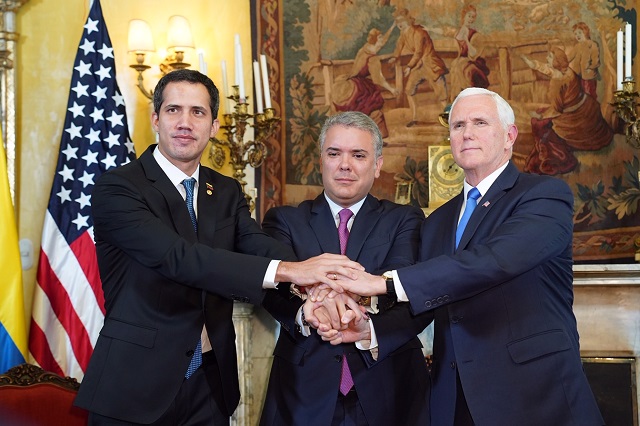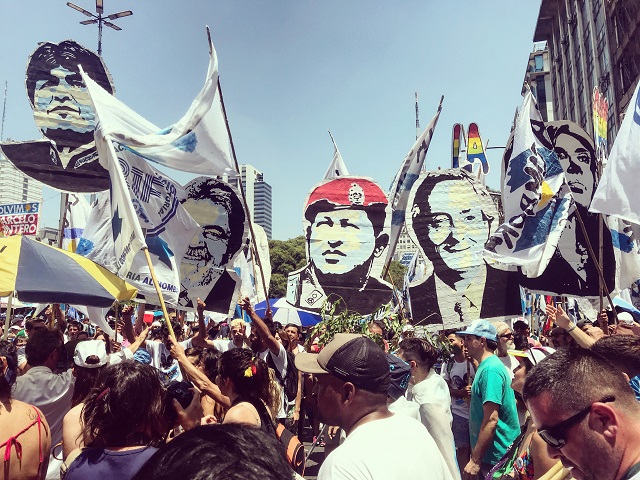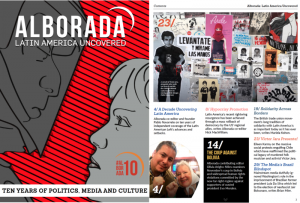Hypocrisy Promotion: Examining US policy in Latin America Analysis
Ideas, New in Ceasefire - Posted on Wednesday, April 15, 2020 13:33 - 0 Comments

When Juan Guaidó pronounced himself President of Venezuela on 23 January 2019, he was swiftly backed by the world’s ‘democracy-loving’ governments. They were headed by the US, with Donald Trump announcing that his administration would ‘continue to use the full weight of United States economic and diplomatic power to press for the restoration of Venezuelan democracy’. Despite the fact Guaidó had never received a single presidential vote, or that four in five Venezuelans had never even heard of him, this was the man to figurehead US ambitions in Venezuela and more broadly in Latin America.
Other nations ‘wedded to freedom’ declared their recognition of Guaidó. ‘The people of Venezuela have suffered enough. It is time for a new start, with free and fair elections in accordance with international democratic standards,’ said then-UK foreign secretary Jeremy Hunt. The US and UK were joined by Canada, the EU and the newly-formed Lima Group of Latin American conservative governments whose only objective is fomenting ‘democracy promotion’ – otherwise known as regime change – in Venezuela. Large numbers of Venezuelans leaving the country were, we were told, fleeing tyranny. The murderous sanctions imposed by the Obama administration, further deepened by Trump, were largely omitted in the international coverage.
Founded in 2017, the Lima Group’s stated goal is to ‘address the critical situation in Venezuela and explore ways to contribute to the restoration of democracy in that country through a peaceful and negotiated solution’. Its creation conferred international legitimacy upon Washington’s long-running campaign to unseat successive Bolivarian governments. The latest push hinged on the 2018 presidential election, won in a landslide by Nicolás Maduro after opposition parties boycotted the vote (even though no evidence of untoward practice was produced then, nor since). In 2012, the Jimmy Carter Center said ‘the election process in Venezuela is the best in the world’. Shortly after the Venezuelan standoff began, British journalist Jeremy Fox, an official observer of the 2018 election alongside former Ecuadorian president Rafael Correa and his Spanish counterpart José Zapatero, told me ‘[t]here is no way this election could have been fraudulent’.
The Lima Group’s feigned moral concern falls apart as soon as one examines the internal democratic shortcomings of various members. The essential hypocrisy within US foreign policy is that democratic and human rights violations are often more prevalent among allies than foes. Yet international media has consistently attacked Venezuela while skating over the democratic rollback behind recent right-wing advances in Latin America.
The case of Brazil is emblematic. For the regional Left, the election of Jair Bolsonaro in late 2018 represented its lowest ebb in decades. Latin America’s largest and most ethnically diverse country elected a far-right authoritarian better known for racist, misogynistic and homophobic invective than any political achievements. The victory was achieved under Brazil’s most blatant disregard for democratic process since the dictatorship ended in 1985.
Bolsonaro had been a distant outlier in Brazil’s presidential election, with former president Lula Da Silva of the Workers’ Party (PT) the overwhelming favourite. As Brian Mier describes, Lula was convicted on false charges and jailed. Bolsonaro went on to win an election utterly tainted by the Lula travesty, which followed the parliamentary coup against the PT’s Dilma Rousseff in 2016. The breakdown of institutional impartiality – essential to a functioning democracy – was rammed home when Bolsonaro appointed Lula’s prosecuting judge, Sergio Moro, as justice minister.
Removing the PT was core to Washington’s Latin America strategy. With the PT gone, Venezuela was isolated and geographically ensnared between two hostile military powers: Bolsonaro’s Brazil to the south and Colombia, under the rightwing government of Iván Duque, to the west. Guaidó’s self-proclamation, coming only 22 days after Bolsonaro’s inauguration, demonstrated that the political ground had shifted sufficiently for a renewed attempt to topple the Maduro government.

It was not only the resolutely-antidemocratic Brazil which pushed US-sponsored ‘democracy promotion’ in Latin America. Honduras’s rightwing government won a fraudulent election victory in 2017. Eight years earlier, the Obama administration had ruptured Honduran democracy by instigating the coup against elected president Manuel Zelaya, putting the Right in power and accelerating the country’s decline. In October 2019, President Juan Orlando Hernández’s brother was convicted on charges of ‘state-sponsored drugs trafficking’ amid strong evidence that the 2017 campaign received cartel funding. In its quest to have sympathetic regimes in Central America, the US has literally installed and protected narco-states. Yet here was Honduras calling for ‘the restoration of democracy’ in Venezuela.
Brazil and Honduras represent the most brazen cases of electoral illegitimacy in Latin America since Trump took office. But other conservative governments have been equally duplicitous. Two years ago, Ecuador’s Lenin Moreno was elected to continue predecessor Rafael Correa’s progressive agenda of social investment, regional integration and national sovereignty: he has since implemented austerity and reduced corporation tax, expelled the UNASUR regional integration body from its Quito headquarters, handed Julian Assange over to British police and welcomed the United States military back into Ecuadorian territory. Taking his cue from the Lula persecution, he pushed ‘lawfare’ against Correa, who remains in exile, and imprisoned former vice-president Jorge Glas (who succeeded Moreno in the role) on dubious charges. Although the Ecuadorian people freely elected Moreno in 2017, his administration has veered sharply rightwards. Huge anti-government protests, triggered by choking IMF terms inflicted on the population, demonstrated the scale of discontent towards Moreno’s broken promises.
The Lima Group was left embarrassed by revelations that Juan Guaidó collaborated with Colombian drug-trafficking paramilitaries to cross into Colombia for Richard Branson’s ‘humanitarian aid’ concert in February 2019, which turned out to be a ploy intended to spark social insurrection in Venezuela. The concert’s host, Colombian president Iván Duque, has repeatedly accused Venezuela of human rights violations while doing little to tackle the horrific violence which, according to national human rights groups, has killed more than 200 social activists since he assumed office in August 2018. His defence minister, Guillermo Botero, resigned in November 2019 following a string of human rights scandals in the country’s military, including extrajudicial executions and a raid that killed at least eight children in August.
When Venezuela was appointed to the UN Human Rights Committee the following month, Duque said ‘all countries in the Lima Group think it’s absurd to reward a country that has committed the worst crimes in all of Latin America’s recent history’. Duque’s selective historical analysis overlooks Colombian state atrocities committed during the 2000s under his mentor, former president Álvaro Uribe, when thousands of young civilians were murdered by the army and dressed-up as guerrillas to imply counterinsurgency success. Furthermore, on 31 October 2019, the National Indigenous Organisation of Colombia (ONIC) said 125 indigenous activists had been murdered under Duque’s government, amounting to what the ONIC described as a ‘genocide’. Huge protests recently erupted in Colombia, with the state’s woeful human rights record, alongside neoliberal reforms, generating widespread public anger.
The Lima Group’s professed support for the ‘restoration of democracy’ has been further undermined by the literal shutdown of democracy in… Lima. In September 2019, President Martin Vizcarra – unelected in the role after predecessor Pedro Pablo Kuczynski resigned over corruption – unilaterally dissolved the National Congress following long-running disputes over political reforms. Congress responded by suspending Vizcarra and nominating vice-president Mercedes Aráoz to succeed him. She resigned after 36 hours. The last congressional dissolution, under hardliner Alberto Fujimori in 1992, led to eight years of quasi-dictatorship and crimes against humanity. The chaos unfolding in the Lima Group’s birthplace encapsulates the glaring inconsistencies within its members and their failures to uphold their own democratic processes.
When Chilean student protests over transport fare increases erupted into immense social revolt, the flaws in the country’s post-dictatorship ‘democracy’ were exposed globally. Although the Pinochet regime formally ended in 1990, Chileans remain beholden to a dictatorship-era constitution that prevents social reform and entrenches inequality. High GDP figures mask the economic discrepancy that mires many Chileans in precarious living conditions and unstable, underpaid work. In the 1970s, Milton Friedman’s Chicago Boys pioneered neoliberal experimentation in Chile through the murder, disappearance, torture and exile of tens of thousands of people: today’s crushing socio-economic conditions are a direct legacy of that state-sponsored violence.
President Sebastián Piñera’s disproportionate and authoritarian response to the protests further exemplifies the dictatorship’s ongoing influence in Chilean society. Popular demands for social and economic redress prioritise a new constitution drafted and agreed through citizen assemblies rather than through a proposed top-down approach that offers little beyond ‘more of the same’. Piñera’s government appears irreparably damaged, with international outrage over police killings and violent methods that have blinded (totally or partially) more than 300 people. The Lima Group, of which Chile is a member, says nothing.
In this context, it almost came as a surprise when, in October, the government of Mauricio Macri in Argentina accepted without argument its landslide election defeat to leftist Alberto Fernández. Typically, any leftwing electoral advance, especially so under Trump, elicits accusations of fraud from a Latin American Right secure of Washington’s backing no matter how tenuous the claims. While these tactics failed to implement regime change in Nicaragua and Venezuela, they finally bore fruition in Bolivia.
The coup d’état against Evo Morales is a major setback for the Latin American Left. Having won the October election, Evo was forced from office after the military aligned with far-right opposition forces to topple a government that had drastically improved the lives of millions of people while also overseeing strong economic growth. This did little to dilute the wrath of European-descendant elites who for centuries had treated Bolivia’s indigenous majority with disdain. Indeed, the coup-mongers’ first acts were to desecrate indigenous symbols and extol Christian supremacy over indigenous culture.
The coup was qualified and legitimised by western liberalism: as security forces massacred Evo supporters, The Observer accused the deposed president of ‘fanning violence’ and ‘creat[ing] a tragedy for Bolivia’, while the far-right extremists who had grabbed power were the ‘properly constituted interim government’. Bolivia remains on a knife edge: intense opposition to the coup among Morales supporters could see Evo return, while broader instability could allow the Right to forcefully redirect Bolivia’s transformative reshaping back towards oligarchic and capitalist interests.
While Morales is in exile in Argentina, Juan Guaidó continues to openly call for US military action against Venezuela. In today’s distorted reality of ‘democracy promotion’, there is nothing incongruous in a self-proclaimed leader encouraging mass slaughter of the very people he claims to govern, nor in ‘democratic’ governments committing physical atrocities against unarmed protesters and economic ones against civil society more broadly. The media’s failure to challenge these contradictions emphasises its complicity in protecting the ruling elites. ‘Democracy promotion’ is a concept that, superficially, is hard to argue with, yet in practice is little more than the palatable flip-side to neoliberalism’s increasing dependence on far-right authoritarianism for survival. Yet as Latin America goes through a mass political awakening rooted in anti-capitalism and social movements, this false legitimacy is fast eroding.
One is reminded of Margaret Thatcher’s meeting with General Pinochet, while he was under house arrest in Britain, in 1999. ‘It is you who brought democracy to Chile, you set up a constitution suitable for democracy, you put it into effect,’ Britain’s former prime minister told the man responsible for thousands of deaths and banning all political dissent, including elections, opposition parties and trade unions.
 Today, Pinochet’s constitution lies in tatters as Chile finally emerges from the dictatorship’s shadow to demand a fairer society. With new democracies forming in the plazas, workplaces and barricades of Latin America, the people are speaking. The Right will stop at nothing to silence them.
Today, Pinochet’s constitution lies in tatters as Chile finally emerges from the dictatorship’s shadow to demand a fairer society. With new democracies forming in the plazas, workplaces and barricades of Latin America, the people are speaking. The Right will stop at nothing to silence them.
This essay is an exclusive extract from the new Alboarada digital magazine. Alborada is an independent media platform on Latin American politics, media and culture.
To receive your free copy of the magazine, simply email Alboarda at info[at]alborada[dot]net.



Leave a Reply